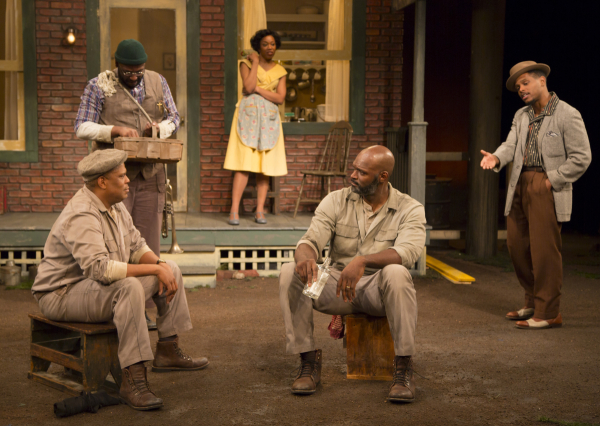Fences

(© T. Charles Erickson)
Audiences familiar with August Wilson’s Pulitzer Prize-winning drama Fences may be accustomed to seeing shiny names like James Earl Jones or Denzel Washington (both of whom won Tony Awards for their starring turns in the play’s two Broadway productions) printed in bold lettering above the title. Yet, under the delicate directorial hand of Tony-winning actress and ‘’Cosby Show” veteran Phylicia Rashad, Wilson’s masterpiece shines just as bright without a high-octane celebrity name in the Long Wharf/McCarter Theatre coproduction, now on the McCarter stage in Princeton, New Jersey.
Not to imply that Rashad’s cast is anything less than Broadway caliber. The production boasts a strong company of actors from top to bottom led by Esau Pritchett, who offers a powerful performance in the typically star-filled role of troubled patriarch Troy Maxson. An initially genial character bursting with tall tales of face-to-face meetings with the Devil and overflowing with affection for his wife, Rose (Portia), Pritchett gradually builds the layers of Troy’s complex character, revealing just how burdened by life and haunted by death he has grown to be in his middle age.
We meet Troy on a Friday evening as he partakes in his weekly payday tradition — a bottle of gin and the company of his good friend and fellow sanitation worker Jim Bono (played by an endearing Phil McGlaston) on the front porch of his weathered, yet visibly sturdy Pittsburgh home (designed by John Iacovelli). Cracks soon appear in Troy’s jaunty manner as he grumbles over his limitations at work as a black man — prohibited from becoming a garbage truck driver — and recalls his younger days as a talented baseball player whose race also denied him a shot at the Major Leagues. As his near-breathless rant firmly plants us in 1950s America — an era laden with racial tensions and socially condoned oppression — we find Troy to be just as much a victim of his own self-imposed limitations as he is a victim of societal circumstance. His failure to make the big leagues had more to do with his age than the color of his skin, according to Rose, and a craving for the stability he lacked in his tumultuous childhood drew him to the routine of his menial job and current domestic lifestyle.
Troy literally boxes himself into a world of manageable size, spending the duration of the play constructing around his property the fences of the play’s title (intended to guard his home against the grim reaper) — though, as the fences tighten their suffocating grip, both Troy and his family find themselves lured outside of its protective boundaries: His son from a previous marriage, Lyons (a smooth-talking Jared McNeill), pursues an unorthodox career as a jazz musician; his son with Rose, Cory (Chris Myers), has his heart set on a college football scholarship; Troy’s mentally handicapped ex-soldier brother, Gabriel (a heartfelt performance by G. Alverez Reid), has moved out of the family home to independently rent his own room; and Troy himself momentarily shirks his familial responsibilities to dabble outside the safe confines of his property line. Only Rose, the infinitely steady hand, stays within the confines of their provincial life. Wilson’s poetic language pours effortlessly out of Portia, who lends both power and humor to the maternal role. Her slow, deliberate speech contrasts Pritchett’s aggressive, rambling cadence, offering her character a silent yet unanimously acknowledged authority that goes far beyond the paradigm of a dutiful 1950s homemaker.
All of the characters’ actions and attitudes are undoubtedly informed by the social and political context of the decade Wilson hoped to capture. Yet, Rashad brings out a universality within the specificity of this family’s experiences, broadening the play’s reach beyond its particular circumstances of time or race. The emotionally charged father-son relationship between Troy and his youngest boy. Cory (Myers), resonates with an especially powerful sincerity as we witness the legacies, both positive and negative, that continue to be passed down from parent to child as generations pass. Myers beautifully shapes Cory as he develops from a powerless boy into an independent young man whose father no longer stands on a pedestal of reverence and fear — a rite of passage for every young adult who comes to the world-shaking revelation that his parents are in fact fallible human beings. Rashad, however, takes this moment of tragic disillusionment and infuses it with a hope that fills us up just in time to reenter the world beyond the Maxsons’ fenced-in yard.











